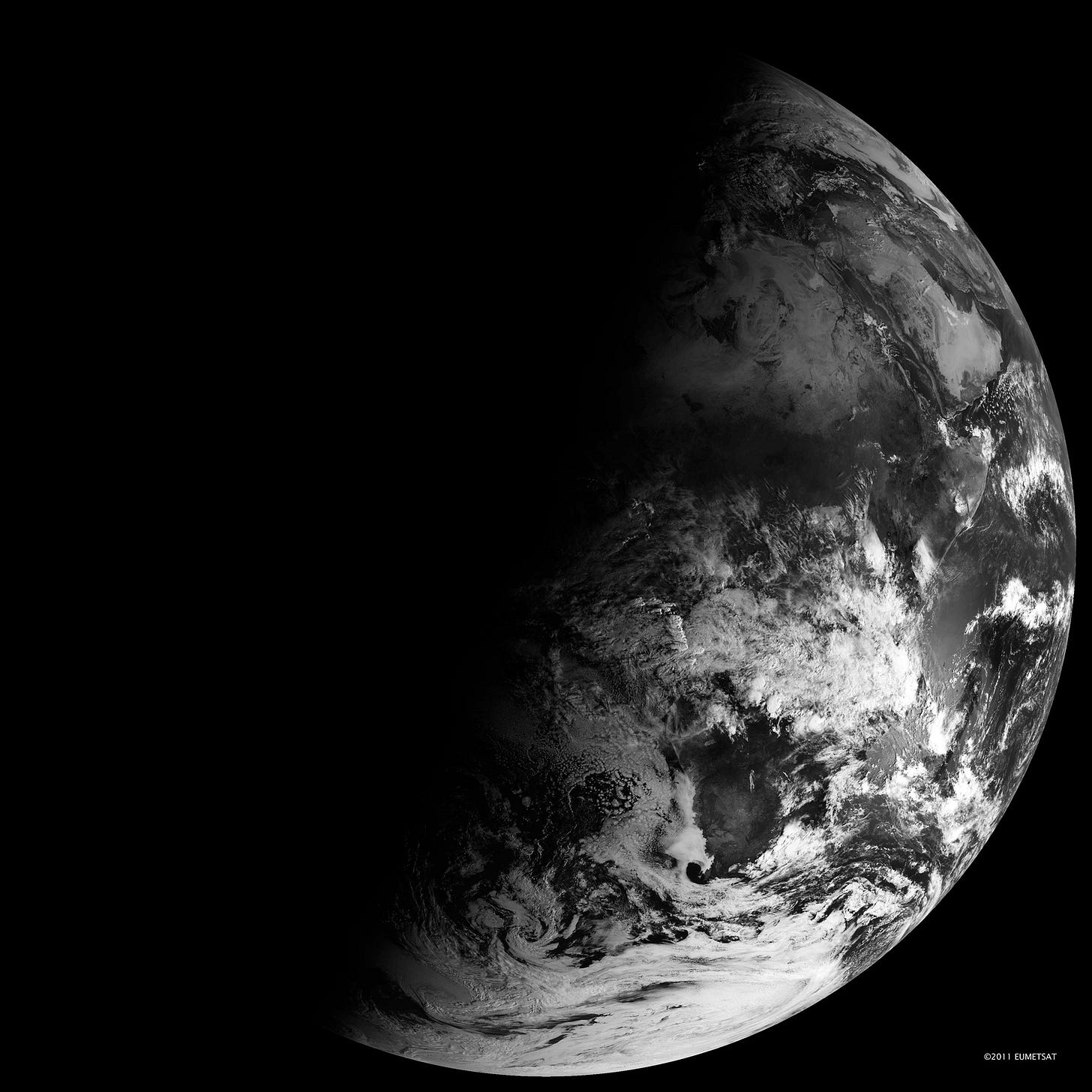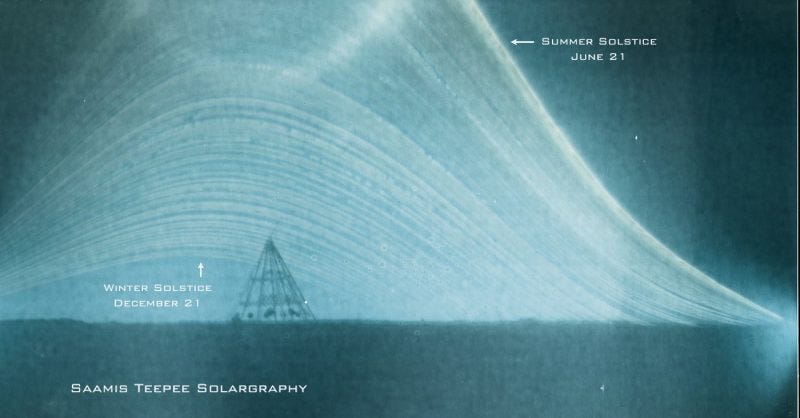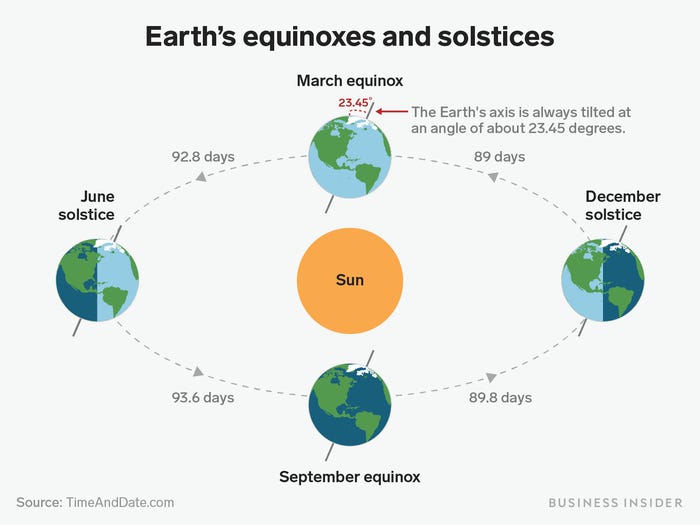Horizons
12/23/21
Hello everyone:
The solstice has come and gone, in a brief pause on Tuesday as quiet as the shift between tides. The days here in the north will slowly widen at the edges, like a waking awareness, as both dawn and dusk reclaim the minutes, then hours, they've lost over the past six months. There's plenty of darkness left to experience - seemingly darker for the cold weeks of January and February ahead of us - but the light has already begun to reverse the tide.

The light brings with it the memory of sustenance and the promise of life to carry us through the hardest months. Even now, seeds and rootlets embedded in their vast communities of microbes and living soil are prepared, when light and warmth release them, to grow restless and then to grow with a full-bodied embrace of the sun.
So much of life on Earth hinges on this annual tide of light. The sun fuels every living cell on the surface of the planet, which means that every ecological community is a conversation about light. It’s worth pausing with the solstice to think about how best to rebuild our world in a way which honors that conversation. After all, from these miraculous realities we build our bodies, our families, our societies, our economies, and our wobbly empires.
The holidays that have meaning for us at this time all take place in the context of this profound phenomenon. Since Neolithic times (or earlier), humans outside the equatorial regions have celebrated the return of the light. The traditions we call Christmas, Hanukkah, Yule, Dongzhi (in China), Yalda (in Iran), and many more are rooted in our ancient habit of attending to the gift of light, which is the gift of life.
So, belatedly, Happy Solstice to you all.
This is the second solstice we've shared since I began this Field Guide. But for this holiday week's brief essay I'm more interested in directing your attention to another echo from the earliest days of this project: the gentle brilliance of Barry Lopez. A new short documentary (just 20 minutes) on Barry, titled Horizons, has dropped at Emergence Magazine, its narrative derived in part from one of the last in-depth interviews he gave before his death a year ago on Christmas day, 2020.
It’s worth watching the doc a couple times, if you’re so inclined, to map out its quiet nuances, which are in fact Barry Lopez’s quiet nuances. The director does a lovely job of honoring Barry’s thinking by letting landscapes speak for ideas and for themselves.
There’s much to say about the form and content of the documentary, but I’ll allow myself the easy way out, suggesting wholeheartedly that you give it your attention. To sweeten the deal, though, here are some of Barry’s words from the documentary that I’ve transcribed for you:
The effort of the imagination is to turn the boundary into a horizon, because there’s no end point for you. The boundary says Here, and no further; the horizon says Welcome.
I think one of the reasons our lives are difficult is because of this separation we’ve insisted on from the rest of the natural world and our insistence on the primacy of human life. Human history is but one dimension of natural history. It’s not the other way around.
What you must do is build a system of civilization that is as aware of darkness as it is of beauty.
What is our ethical relationship with the world outside ourselves? The sign of where it goes wrong is when the world outside the self is no longer the companion but the servant.
I know we’re living in an awful time, and we’re reminded of it every day… I can feel when I travel the anguish that people carry where in another time they might have been carrying hope. And I want as a writer to do something to ameliorate that anxiety because the more anxious we are the more paralyzed we become. And in our paralysis is our ending.
Traditional people would say, This is something that has to be dreamed again… We need another way of knowing, and if we are to succeed at that we must listen not only to each other but also to those we have systematically marginalized.
The stories I’m talking about, that I’m trying to write, are stories that contribute to stability, to the stability of my own culture.
Emergence has an excellent companion essay by Fred Bahnson, who had talked with Lopez over three days to provide the interview material which is the documentary’s foundation. It’s well worth reading to learn more about Lopez’s life and writing. Bahnson tells us, for example, that when Lopez was in the Arctic laying the groundwork for his astonishing book, Arctic Dreams, he made a habit of asking Inuit elders for their assessment of white North American culture. They repeatedly described us as “lonely.” Lopez plays with this idea to liken our separation from the natural world as a one-sided “divorce,” initiated by us, and only now that the consequences are clear does it occur to humanity “that it has lost its spouse.”
In the Anthropocene, Lopez told Bahnson, we are no longer as well served by stories of individual cultural heroes. Civilization has pushed past ecological limits, so we need stories that redirect civilization: “We need new narratives, at the center of which is a concern for the fate of all people. The story can’t be about the heroism of one person. It has to be about the heroism of communities.”
I would argue that the stories that resonate now are somewhere in between. Not the solo hero’s journey, certainly, but the individual in service to and in alliance with the community, whether that community is plants, animals, and soil, or fellow humans facing up to their local Anthropocene reality.
To that end, then, here are few curated stories for you:
Fools and Dreamers: Another documentary I mentioned months ago, about a simply wonderful reforestation/regeneration project in New Zealand, led by a cheerful charismatic Kiwi who figured out that overgrazed, gorse-infested land will recover beautifully with a little benign neglect.
Biodiversity: The language of wilderness: From the Northeast Wilderness Trust, a fine illustrated article that gets deep into why old-growth forests, now rare in New England, harbor a richer and more complex array of life. (Also, anyone wanting a fine and friendly introduction to the basic science that underlies modern conservation efforts should watch this video talk by Mark Anderson, Director of Conservation Science for the Nature Conservancy’s eastern region, and the board chairman of the Northeast Wilderness Trust.)
Half-Earth to make us whole: from Yale e360, a heartfelt and brilliant essay by ecologist Carl Safina on how protecting half the Earth for living systems will also provide extraordinary benefits to humans, particularly those who suffer from pollution, poverty, and hunger in a world obsessed with growth. As we protect half the Earth, we must also scale down the human project to provide equity for all.
So that’s it for this holiday week. Whether you’re moved by imagining the Earth as a buoy in the Sun's tide, or by Barry Lopez’s words, or by other fools and dreamers working to move us back into alliance and allegiance and empathy with the real world, I hope I’ve provided a bit of warmth in these dark days.
Get outside if you can. Enter the woods to find darkness and beauty entangled. Watch the sun inch its way higher in the sky as our journey around it tilts us toward the light.

Above all, remember that the light that is returning is already within you.
Take care,
Jason








Nice visual and written imagery, Jason, and thanks for the offering of "Horizons".
I'm just starting to read "The Dawn of Everything" by David Grabber and David Wengrow. It's a re-examination of the history of humanity, without making the assumptions about how and why humans developed systems of inequality and hierarchy. I think there's some relevance to your last few essays about the myth of constant growth.
Our home hopes your home enjoys a peaceful holiday season.